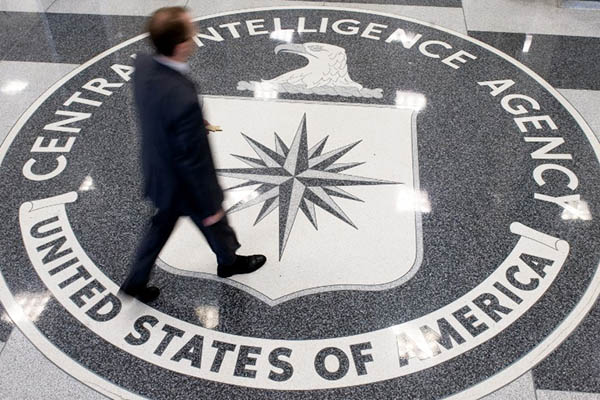
Saul Loeb—AFP
Spy agency claims story reported by ‘The New York Times’ and The Intercept is ‘fictional’
The CIA on Saturday categorically denied reports that it was fleeced by a mystery Russian who promised compromising information on U.S. President Donald Trump.
The secretive agency rarely issues any kind of comment, but came out to deny the report in The New York Times and a similar one in The Intercept, an online journal focusing on national security issues.
“The fictional story that CIA was bilked out of $100,000 is patently false,” the Central Intelligence Agency said in a statement sent to AFP. “The people swindled here were James Risen and Matt Rosenberg,” the CIA said, referring to Times reporter Rosenberg, who wrote the story, and Risen, a former Times reporter who authored The Intercept’s article.
Both reports appeared on Friday.
The president tweeted approvingly that The Times article shows a need to “drain the swamp” in Washington.
In a story worthy of a John le Carre novel that included secret USB-drive handovers in a small Berlin bar and coded messages delivered over the National Security Agency’s Twitter account, CIA agents spent much of last year trying to buy back from the Russians hacking programs stolen from the NSA, the Times reported. The seller, who was not identified but had suspected links to both cyber criminals and Russian intelligence, tantalized the U.S. spies with an offer of the NSA hacking tools that had been advertised for sale online by a group called the Shadow Brokers.
Some of the tools, developed by the NSA to break into the computers of U.S. rivals, were used by other hackers last year to crack or infect computer systems around the world. The Times described the Americans as “desperate” to get the tools back.
Reached through a chain of intermediaries, the seller reportedly wanted $1 million after quickly dropping his opening demand of about $10 million. The $100,000 was an initial payment by U.S. agents still dubious he really had what he was promising.
In its report, the Times cited U.S. and European intelligence officials, the Russian, and communications the newspaper reviewed. The seller also repeatedly pressed U.S. agents with offers of compromising materials, or kompromat, on Trump, the Times said.
But an investigation was already under way in Washington on possible links between Moscow and Trump’s 2016 election campaign, and the U.S. agents reportedly did not want to get involved in anything that smelled of the politics back home. U.S. intelligence officials say that Russia interfered with the election to help elect Trump, and that it continues to use disinformation to sow confusion in the American political system.
The Intercept reported that the “off-the-books communications channel” with Russia created rifts in the CIA. The agency is led by Trump loyalist Mike Pompeo, but many of its staffers are still smarting over Trump’s repeated harsh comments about the intelligence community’s role in the Russia meddling investigation.
Special Counsel Robert Mueller is probing the possible links between Trump’s presidential campaign and Moscow, as well as possible obstruction of justice.
Democratic Congressman Ted Lieu said in a tweet Friday that Risen’s article “suggests the CIA Director fears getting information damaging to @realDonaldTrump that is being offered by Russians.” If that’s true, Lieu said, “the CIA Director needs to explain his actions to Congress. He took an oath to the Constitution, not to Trump.”
Trump on Saturday referred favorably to the Times article about the Russian who “sold phony secrets on ‘Trump’ to the US,” and noted the operative reportedly had drastically lowered his original price. “I hope people are now seeing and understanding what is going on here. It is all now starting to come out — DRAIN THE SWAMP!” he tweeted, in a reference to what he sees as a need for reform.
Trump has frequently criticized the Times, which has published numerous investigative reports about him and his administration, calling it a “failing” newspaper providing “fake news.” Trump has also repeatedly denied any collusion with Russia.
The Times reported that, in the end, the deal with the Russian broke down last month as the Russian failed to come up with any of the sought-after NSA materials, and the Trump-related material was either already known or untrustworthy. The Russian was told by the Americans to leave Western Europe and not return, according to the Times.
